The Supreme Court today refused to entertain a plea challenging the order of the Kerala High Court, which held that it was not compulsory for political parties to set up an Internal Committee to address sexual harassment complaints as per the POSH Act 2013.
Background
The Kerala High Court’s decision stemmed from a Public Interest Litigation (PIL) filed by the Centre for Constitutional Rights Research and Advocacy (CCRRA) in 2022. The PIL sought directions for political parties, including the Indian National Congress, Bharatiya Janata Party, and Communist Party of India (Marxist), to establish an ICC in compliance with the POSH Act. The High Court analysed the definitions of ‘workplace,’ ’employee,’ and ’employer’ under the Act and concluded that political parties do not qualify as workplaces since there is no employer-employee relationship among their members. The Court also noted that political parties are not covered under the term ‘appropriate Government’ or ‘local authority’ as per Section 2(g)(i) of the POSH Act. However, the Court clarified that film production units are considered establishments under the Act and must constitute an ICC accordingly.
Facts of the Case
The matter reached the Supreme Court following a Special Leave Petition (SLP) filed by Advocate Yogamaya MG, challenging the Kerala High Court’s judgment in Centre for Constitutional Rights Research and Advocacy v. State of Kerala & Ors. (2022). The petitioner contended that political parties, being organizations with a significant number of members, should be mandated to establish an Internal Complaints Committee (ICC) in compliance with the Sexual Harassment of Women at Workplace (Prevention, Prohibition and Redressal) Act, 2013 (POSH Act). The Kerala High Court had previously ruled that political parties are not obligated to constitute an ICC under the POSH Act, as there is no employer-employee relationship among party members. The Supreme Court bench, comprising Chief Justice of India B.R. Gavai, Justices K. Vinod Chandran, and A.S. Chandurkar, heard the petition.
Contentions of the Petitioner
Senior Advocate Shobha Gupta, representing the petitioner, argued that the High Court had overlooked the broad definition of ‘aggrieved woman’ under Section 2(a)(i) of the POSH Act, which includes any woman, whether employed or not, who alleges to have been subjected to any act of sexual harassment. Gupta emphasized that the absence of an IC within political parties violated constitutional rights, including Articles 14 (equality before the law), 15 (prohibition of discrimination), and 21 (protection of life and personal liberty). She further contended that political parties, despite being voluntary organizations, function in an organized setup and should be held accountable for ensuring a safe environment for women.
Contentions of the Respondent
The respondents, representing the Union of India and political parties, countered that the POSH Act applies only to workplaces where an employer-employee relationship exists. They argued that political parties are voluntary associations without formal employment structures, and as such, are not covered under the Act. The Kerala High Court had concurred with this view, stating that political parties do not meet the statutory definition of ’employer’ under Section 2(g) of the POSH Act.
Court’s Observation
During the proceedings, Chief Justice Gavai questioned the applicability of the POSH Act to political parties, stating, “When a person enters a political party, it’s not a job; there is no payment.” He further remarked, “How do you put the political parties in a workplace?” These observations underscored the Court’s view that political parties do not constitute formal workplaces as envisaged under the POSH Act. The bench also expressed concerns that extending the Act to political parties could lead to misuse and potentially serve as a tool for blackmail, warning against the negative implications such a move might bring.
Court’s Order
The Supreme Court, after considering the arguments, declined to interfere with the Kerala High Court’s judgment. The bench issued the following order:
“Permission to file special leave petition is granted. Delay condoned. We are not inclined to interfere with the impugned judgment and order passed by the High Court. The special leave petition is, accordingly, dismissed. Pending application(s), if any, shall stand disposed of.”
This decision effectively upheld the High Court’s ruling that political parties are not required to establish an IC under the POSH Act.
Written by Adv. Deeksha Rai



